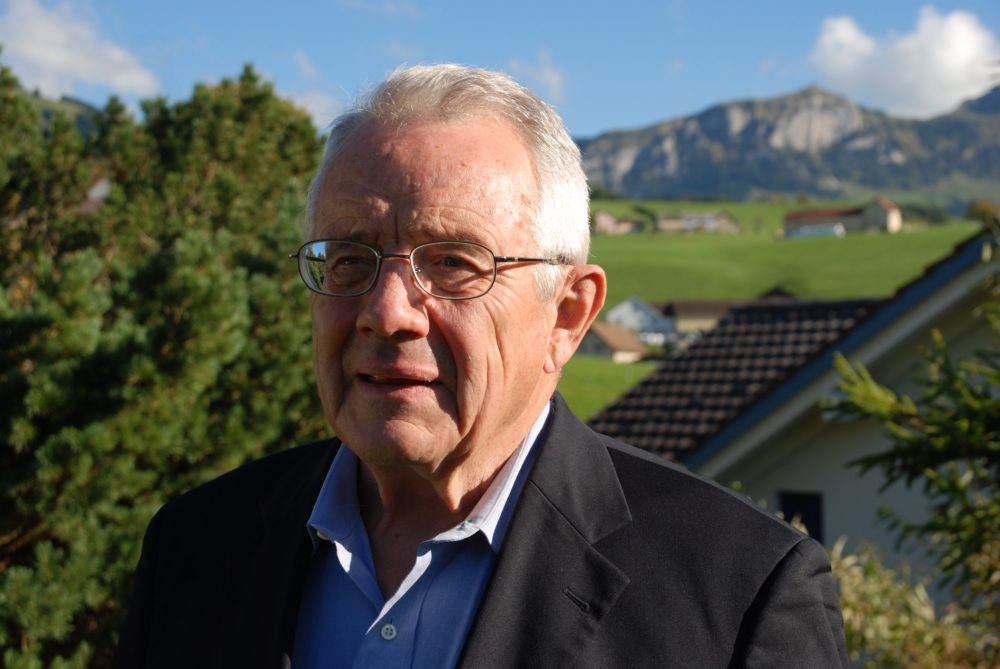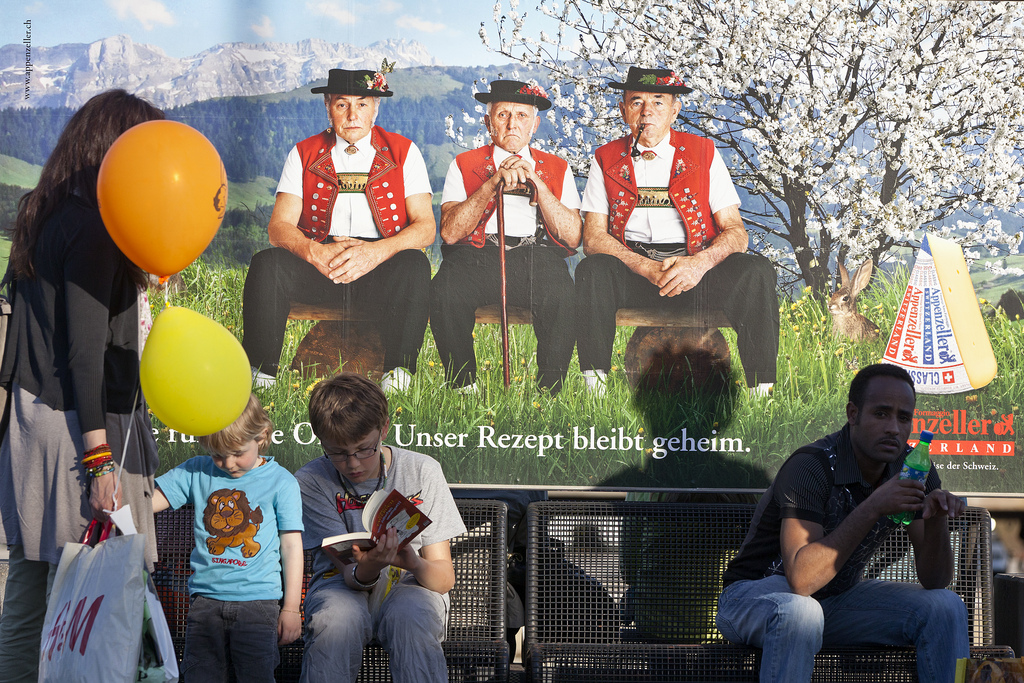Appenzell: an exception among exceptions

Appenzell in the northeast of Switzerland is perhaps best known for its famous cheese, but former Swiss Justice Minister Arnold Koller, who hails from the canton himself, calls it an example of democracy in action.
swissinfo.ch : How do you explain to foreigners the two half cantons of Appenzell?
Arnold Koller: In a nutshell, Appenzell, especially Appenzell Inner Rhoden, my home region, is an exception among exceptions – Switzerland is already considered an exceptional case in Europe.
That’s particularly because we are by far the smallest canton by population. Inner Rhoden has only about 15,000 inhabitants, Ausser Rhoden, a good 52,000.
There are not many of us, but we are idiosyncratic, and, above all, we have a long history. Now and then other Swiss tell me: “For us, 15,000 is the size of a modern commune.” But nowhere else has this sense of identity!
In 1513 – we weren’t divided at that point – we were admitted as the 13th member of the alliance of the Confederation. These centuries of independent history have left their mark on the Appenzellers. There is a great spirit of independence here – and even of stubbornness.
And then we have wonderful scenery. This combination of gentle countryside and an obstinate, idiosyncratic and independent people plus the smallness of our partitioned canton – these are the features that have moulded the character of its people.

More
Appenzell marks 500 years of Swissness
swissinfo.ch: It is said that people from Appenzell are tough. There is also the famous song: “My father is from Appenzell. He eats cheese together with the plate”. It means that they were so poor that they used bread instead of a plate.
A.K.: Until the Second World War, Appenzell, in particular Inner Rhoden, was an agricultural society and, as such, rather poor. We practised embroidery and pig breeding for extra income. But the farms were very small. A family could barely make enough to live. And that of course has influenced the local character and made people tough.
We don’t have the same kind of landscape as in cantons like Glarus where the mountains rise steeply to 2000 metres. Ours is much gentler. The economy was based on dairy farming, with meadows used for fodder, and people also raised pigs. The women did embroidery, but there was also a huge crisis in the embroidery industry in the 19th century.
Until recently, we were extremely weak financially as a canton. Now we have made a lot of progress, and are economically average. But the hard times have also left their mark.
swissinfo.ch: Why did Appenzell resist for so long the process of industrialisation in Switzerland in the mid-19th century? People here preferred to work at home rather than in a factory.
A.K.: Here we have once again to distinguish between Inner Rhoden and Ausser Rhoden. In the 19th century Ausser Rhoden was one of the first cantons in Switzerland to become heavily industrialised. Inner Rhoden remained an agricultural canton until after the Second World War.
The famous sociologist Max Weber came up with a theory that the Protestant religion made the people were very diligent and open to industrialisation. The Catholic religion, however, was always a bit wary of money and wealth. For me it is no coincidence that Ausser Rhoden (Protestant) was one of the first industrialised cantons and Inner Rhoden (Catholic) was an agricultural canton until recently.
Arnold Koller was born in Appenzell on August 29, 1933. He studied economics at the University of St Gallen and law at the University of Fribourg, completing his doctorate in 1966.
He spent 1971-2 studying at the University of California, Berkeley.
In 1972 he was appointed Professor of European and International Law at the University of St Gallen, where he taught until his election to the Federal Council in 1986.
From 1973 to 1986 Koller was president of the Cantonal Court in Appenzell Inner Rhoden.
In June 1971, Koller – a Christian Democrat – was elected to the House of Representatives in the Swiss parliament.
In 1984/85 he held the office of speaker of the House of Representatives.
He was elected to the Federal Council, the Swiss government, on December 10, 1986. For the first two years he headed what was then called the Armed Forces Ministry.
In February 1989 he became justice minister. He held Switzerland’s annually rotating presidency in 1990 and 1997.
He stepped down from the Federal Council on 30 April 1999.
Koller has two daughters. In the Swiss army, he held the rank of colonel.
swissinfo.ch: Former Finance Minister Hans-Rudolf Merz has recounted how in the early 15th century the treasurer of Appenzell, instead of handing over the tax demanded, merely wrote a promise to pay. Is this insubordination typical of Appenzell?
A.K.: Yes, at that time Appenzell belonged to the monastery of St Gallen. And the freedom wars turned Appenzell against the abbot of St Gallen and his Austrian allies. When they wanted to collect too many taxes and tithes, the people of Appenzell revolted and this led the two wars of liberation in 1403 and 1405. As a result, they achieved independence from the monastery.
swissinfo.ch: Inner Rhoden and Ausser Rhoden split in 1597 on religious grounds. In the current era of globalisation, how can two half cantons continue to exist?
A.K.: In the partition letter of 1597, it says at the end: “As long as both parties so desire.” So we have not ruled out merging again. But of course this religious divide has left its mark, even in everyday life.
Until the Second World War it was really simply a matter of coexistence. We were neighbours but didn’t have much to say to each other. Nor were there any common clubs.
Inner Rhoden tended to cooperate with St Gallen rather than with Ausser Rhoden. The only club which crossed cantonal boundaries was the officers’ association, but it was dominated by Ausser Rhoden. Inner Rhoden hardly had any officers.
swissinfo.ch: In comparison to other countries, the split between the two half cantons was peaceful…
A.K.: The division of the land was a hugely civilised achievement when you think of the religious friction at this time. Even in Switzerland these assumed the scale of civil wars. One thing that facilitated the split was mediation by other members of the Confederation.
swissinfo.ch: How did you explain to foreign partners the fact that voters in Inner Rhoden rejected female suffrage at the open-air parliament (Landsgemeinde) in 1990?
A.K.: I’ve had to explain it before, especially in Berkeley, which was very progressive. It was no easy task. I would often reply slightly mischievously: “Explain the death penalty to me!” (Laughs). These are relics of the past for which there is no explanation in today’s society.
But of course there were reasons, for example, fear for the survival of the Landsgemeinde. I remember even in the 1980s young women were polled, and they said: “No, we don’t want it, for love of the Landsgemeinde.”
The Landsgemeinde is not just a political but a social experience. Everyone comes together to elect the government and to accept or reject laws. You cannot explain that to people who haven’t experienced it first-hand.
swissinfo.ch: And how did you react when in the same year the Federal Court granted women’s suffrage, overturning the vote at the Landsgemeinde?
A.K.: That was amazing. It seemed like a Biblical judgment. In Ausser Rhoden, where women’s suffrage had been accepted by a very narrow majority, there were some difficulties. But in Inner Rhoden women and men have been together at the Landsgemeinde since 1991 as if it had never been otherwise.
I’ve always said that legally, the judgment of the Federal Court was wrong, but politically it really worked wonders. We caused a worldwide sensation. Many international journalists came here. It was seen as a museum piece but the Landsgemeinde is very much alive. In this respect, the Federal Court judgment was liberating.
(Translated by Vincent Landon)

In compliance with the JTI standards
More: SWI swissinfo.ch certified by the Journalism Trust Initiative

You can find an overview of ongoing debates with our journalists here. Please join us!
If you want to start a conversation about a topic raised in this article or want to report factual errors, email us at english@swissinfo.ch.